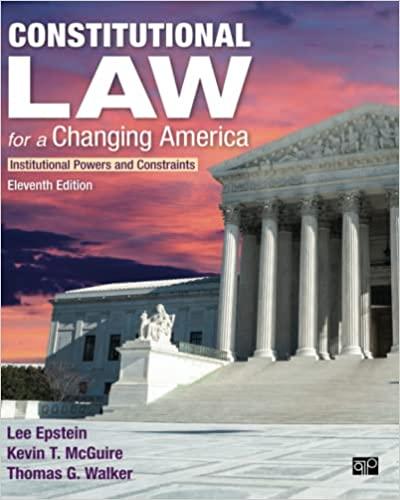Question
Answer the question. Include references to Supreme Court cases in your answer. 1. Youngstown Sheet & Tube Co. v. SawyerandThe Prize Cases Congress could not
Answer the question. Include references to Supreme Court cases in your answer.
1. Youngstown Sheet & Tube Co. v. SawyerandThe Prize Cases
Congress could not reach agreement on whether to authorize the erection of an electrified fence on the border between Texas and Mexico and has not passed any law on the subject. But it is debating whether to authorize the building of this fence in its current legislative session. Congress, in fact, has been considering such legislation for three years and has yet to vote the proposal out of committee. The debate in Congress has centered on: 1) humanitarian issues related to having an electrified fence; 2) the effect such a fence would have on United States-Mexico relations; and 3) the cost compared with whether the fence will do much to stop terrorists from entering the country.
Two weeks ago the President issued an executive order authorizing the erection of an electrified fence between Texas and Mexico, and he deployed 20,000 federal troops to the border area to begin the work. The President's executive order states that his action was necessary in order to protect the United States from possible terrorists entering the country at the border between Texas and Mexico.
Is the President's action constitutional? Explain.
2. Holtzman v. Schlesinger, 484 F.2d 1307 (2d Cir. 1973)
In an attempt to stop the growth of North Korea's nuclear capability, the President has placed a naval blockade around North Korea, halting all ships coming into or leaving North Korea and inspecting these ships for nuclear material. Under international law, a blockade is an act of war. The President did not seek congressional approval of this blockade.
What is the outcome if a lawsuit is filed challenging the President's authority to impose a naval blockade without Congress first declaring war?
3. Hamdi v RumsfeldandBoumediene v Bush
Sadly, the United States suffers another attack by terrorists who seized a nuclear power plant and almost caused a deadly release of radiation. They were stopped and captured before achieving success. One of the terrorists is a United States citizen, and the others are foreign nationals. The President designates all as enemy combatants and orders that they be held at a United States military facility somewhere in the United States. The order denies them a hearing before a tribunal that would determine specific facts in support of continued detention. Each detainee files for a writ of habeas corpus in federal district court seeking release unless the government can show some basis for their continued detention.
Is the President's order denying a hearing to all individuals constitutional? Explain.
Step by Step Solution
There are 3 Steps involved in it
Step: 1

Get Instant Access to Expert-Tailored Solutions
See step-by-step solutions with expert insights and AI powered tools for academic success
Step: 2

Step: 3

Ace Your Homework with AI
Get the answers you need in no time with our AI-driven, step-by-step assistance
Get Started


